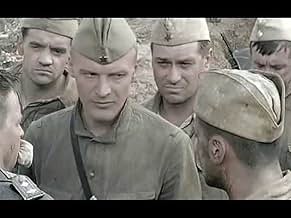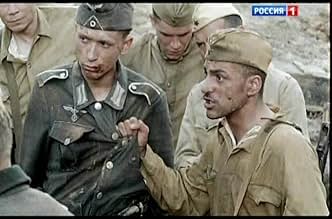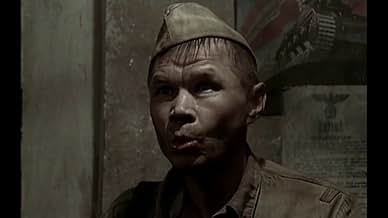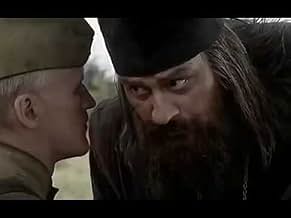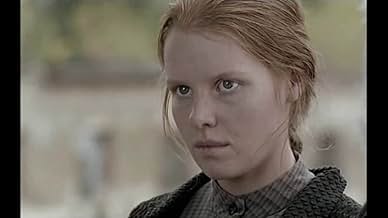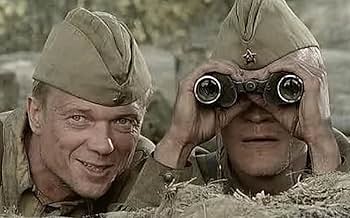Shtrafbat
- Série télévisée
- 2004
- 9h 10min
NOTE IMDb
7,3/10
1,6 k
MA NOTE
Ajouter une intrigue dans votre langueDrama of the penalty parts of political prisoners, who fought on the Soviet fronts.Drama of the penalty parts of political prisoners, who fought on the Soviet fronts.Drama of the penalty parts of political prisoners, who fought on the Soviet fronts.
- Récompenses
- 2 nominations au total
Parcourir les épisodes
Avis à la une
Shtrafbat is the story of a Soviet penal battalion at the height of the Second World War. The film follows the characters from the formation of the battalion in the prison yard to its complete decimation in combat against the Germans.
The film is a good introduction to the complexities of the Soviet war effort, covering the various motivations the characters have for signing up and the callous attitude of the military towards these people as well as giving a good idea of what an absolute hell the Eastern Front was.
The premise and the acting are generally good, but the story seems to move along in fits due to a mediocre directorial effort on the part of Dostal'. Perhaps he was unfamiliar with the mini-series format or just short on time, I don't know, but on the whole the film seems rather artificial and constructed. Segue contrast with "Seventeen Moments of Spring" and "Shield and Sword". Oh Well.
Shtrafbat could have been a whole lot better. Certainly. It is nonetheless worth watching for the history and (if for nothing else) the excellent final scene.
The film is a good introduction to the complexities of the Soviet war effort, covering the various motivations the characters have for signing up and the callous attitude of the military towards these people as well as giving a good idea of what an absolute hell the Eastern Front was.
The premise and the acting are generally good, but the story seems to move along in fits due to a mediocre directorial effort on the part of Dostal'. Perhaps he was unfamiliar with the mini-series format or just short on time, I don't know, but on the whole the film seems rather artificial and constructed. Segue contrast with "Seventeen Moments of Spring" and "Shield and Sword". Oh Well.
Shtrafbat could have been a whole lot better. Certainly. It is nonetheless worth watching for the history and (if for nothing else) the excellent final scene.
With the war not going well for the Soviet Union, Stalin accepted volunteers from the prisons and used the prisoners as shock troops. This is the story of one such battalion. There are petty crooks, political prisoners, soldiers kicked out of other units, gray-haired veterans of the White Army plus some dangerous criminals.
They are thrown into battle ill-equipped, untrained and face the threat of the NKVD if they show signs of cowardice or failure.
The special effects are rudimentary and many of the minor characters are one-dimensional, but the overall story is very human and riveting.
I have not seen a version with subtitles or dubbing. Viewing the show required liberal use of the pause button and explanations from a native speaker of Russian.
They are thrown into battle ill-equipped, untrained and face the threat of the NKVD if they show signs of cowardice or failure.
The special effects are rudimentary and many of the minor characters are one-dimensional, but the overall story is very human and riveting.
I have not seen a version with subtitles or dubbing. Viewing the show required liberal use of the pause button and explanations from a native speaker of Russian.
Just saw two episodes. Such a refreshing view, despite the grim subject, to see actors playing the story and not their narcissism. Perhaps it's the script but I don't know. These actors are great. The absence of big bucks is funny sometimes, battle scene in minefield, but then artistic. I haven't watched Band of Brothers end to end. Hear it is very good. But to see real passion and not sentimentality, argument and not posing, the glimpses of the women are amazing, the clarity of the narrative, the steady invention with the camera without being arty, and the absence of gratuitous gore. All left to the actors and story. Anyway, just a joy.
Life in the Soviet Union's penal battalions was horrific, and this series does a wonderful job of portraying the ugly reality for many persons who perished during the second world war. It is not for the faint-hearted, and certainly extremely realistic when it comes to the ugliness of patriarchal society, and the vision men had (have) of women, many times as mere sex-objects. Certainly the series explores the basal level of the ugliness of human nature, which makes it that much more believable.
Its only detriment, is a cheap politicised usage of religion, especially for Russian nationalistic purposes (otherwise it would have merited a "9 star" rating). Overlook it, and the production is truly a masterpiece of war drama.
"Shtrafbat" (2004), an 11-part TV series, is about Soviet Army battalions made up of many kinds of prisoners, hoping to be "rehabilitated" of their "crimes".
"Shtrafbat" (Punishment or Penal Battalions) were made up of deserters, political prisoners, and former POWs who had returned from German captivity (according to Stalin: allowing ones-self to be captured alive & imprisoned was akin to surrendering, & surrendering was considered to be treason, a crime punishable by death), and even "regular" criminals sent from prison-camps, so the suspicion that these people wouldn't fight well, or might even surrender, was high. These "criminals" were "graciously" allowed "a second chance" by the government, a chance to "wash away their past sins with their own blood."
These "Shtrafbat" were sent on the most dangerous and difficult missions (i.e. those with low survivability) and were followed into battle by troops who were called "Zagrad-Otryad" (Blocking Troops), and were under NKVD (precursor to the KGB) control. Sometimes these troops were almost as large as the actually fighting units they blocked. They were under orders to shoot any Soviet soldiers who were thought to be retreating, be they wounded or not.
The few "Shtrafbat" soldiers who lived through it for some months, were considered rehabilitated and returned to regular army units. The KIAs were rehabilitated posthumously, sparing their families from being branded as families of traitors, "enemies of the Soviet people."
"Shtrafbat" (Punishment or Penal Battalions) were made up of deserters, political prisoners, and former POWs who had returned from German captivity (according to Stalin: allowing ones-self to be captured alive & imprisoned was akin to surrendering, & surrendering was considered to be treason, a crime punishable by death), and even "regular" criminals sent from prison-camps, so the suspicion that these people wouldn't fight well, or might even surrender, was high. These "criminals" were "graciously" allowed "a second chance" by the government, a chance to "wash away their past sins with their own blood."
These "Shtrafbat" were sent on the most dangerous and difficult missions (i.e. those with low survivability) and were followed into battle by troops who were called "Zagrad-Otryad" (Blocking Troops), and were under NKVD (precursor to the KGB) control. Sometimes these troops were almost as large as the actually fighting units they blocked. They were under orders to shoot any Soviet soldiers who were thought to be retreating, be they wounded or not.
The few "Shtrafbat" soldiers who lived through it for some months, were considered rehabilitated and returned to regular army units. The KIAs were rehabilitated posthumously, sparing their families from being branded as families of traitors, "enemies of the Soviet people."
Le saviez-vous
- ConnexionsReferenced in Comedy Club: Épisode #1.13 (2005)
Meilleurs choix
Connectez-vous pour évaluer et suivre la liste de favoris afin de recevoir des recommandations personnalisées
Détails
- Durée9 heures 10 minutes
- Couleur
Contribuer à cette page
Suggérer une modification ou ajouter du contenu manquant

